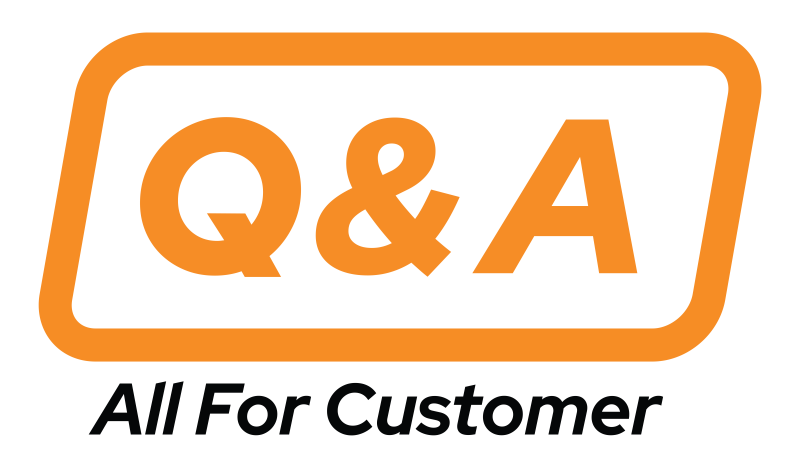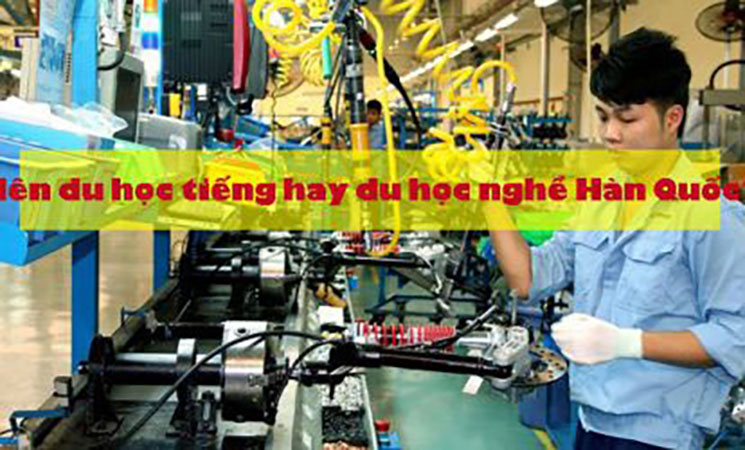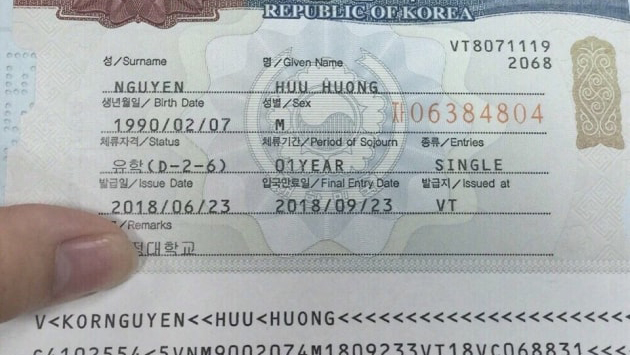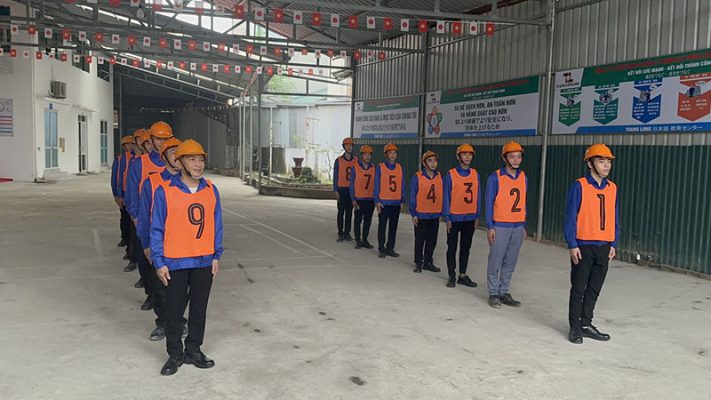With the development of the South Korean study abroad market in recent years, study abroad programs have been increasingly expanded, providing choices for students. Many students wonder whether they should pursue language study or vocational training in South Korea. If you are still uncertain about your choice, let’s take a look at the following article. This article will help you understand and evaluate the two programs by comparing them. Let’s explore together!
What is Vocational Study Abroad in South Korea?
Simply put, the vocational study abroad program in South Korea involves studying a specific trade, combining both theoretical learning and practical experience. Upon completing the course, you will receive a vocational certificate in Korean. During your studies and practical training, you will earn a salary, in addition to any part-time work you may do outside.
What is Korean Language Study Abroad?
Korean language study abroad is a program for international students to participate in Korean language courses in South Korea with a D-4-1 visa. Language study is the first (mandatory) step before you can enroll in a specific major at a college or university in South Korea.
UNDERSTANDING the Korean Language and Vocational Study Abroad Programs
To answer the question “Should I study the Korean language or pursue vocational training in South Korea?”, you need to have a clear understanding of these two programs. So, what do these programs actually teach?
Korean Language Study Abroad Program
>>Purpose
To improve the Korean language speaking skills of international students, or more specifically, to help them understand Korean culture in the initial stage.
It is the first door you must pass through before continuing your study abroad journey in South Korea.
>>Program Content:
In reality, learning a new language is challenging. It also depends on various objective and subjective factors: talent, effort, and individual learning ability.
Typically, the language study program lasts from 6 months to 2 years. Each semester lasts for 2.5 months, corresponding to levels from beginner to advanced.
During the Korean language study program, you will receive training in four skills: Listening, Speaking, Reading, and Writing, taught by experienced and qualified instructors.
Vocational Study Abroad Program in South Korea
>>Purpose
To provide vocational training for international students in the land of kimchi. In South Korea, vocational schools are generally colleges. These colleges can be standalone or part of a university training system.
International students come to South Korea to study a specific trade they have chosen and wish to pursue in the future.
>>Content of the Vocational Study Abroad Program:
In the first 6 months of enrollment, students learn Korean while simultaneously studying their trade. Classes are held 5 days a week.
After 6 months of study, international students can go for internships: 4-5 days a week, and attend school for 2 days a week.
The average salary during the internship period is around 1,200,000 won or more, depending on the specialty and skill level. For example, the salary can be as high as 2,000,000 won per month or more if you work as a ship welder.
Comparison of Korean Language and Vocational Study Abroad Programs
Advantages of Language Study and Vocational Training Programs
Currently, language study and vocational training in South Korea are popular choices for many young people after completing high school. Both programs offer numerous advantages and opportunities for students, including:
| Vocational education in South Korea | Korean language study in South Korea | |
| Similarities | Job opportunities after graduation (100%)
Language skills improve rapidly Short study duration Study and experience the unique aspects of Korean culture in a modern, high-quality environment Conditions for vocational study and Korean language study are not overly complicated Reasonable costs Participate in extracurricular activities to understand and experience Korean culture Easily integrate and adapt to the culture and lifestyle of the local people Opportunities for long-term, stable employment and residency in South Korea with an E7 visa |
|
| Differences | Learning while gaining practical experience (paid) | Learning while gaining practical experience (unpaid) |
How do the language study program and vocational study program differ?
>>> Eligibility Requirements
| Vocational education in South Korea | Korean language study in South Korea | |
| Similarities | Age Requirements: 18 to 30 years old.
Must be in good health, free from tuberculosis or other infectious diseases. No criminal record. Family members must not be residing illegally in South Korea. Not subject to any travel restrictions. |
|
| Differences | Must have graduated from high school with an average score of 5.0 or higher.
Must possess a Korean language certificate equivalent to TOPIK level 2 or KLAT level 2 (beginner level, level 2). |
Must have graduated from high school with an average score of 6.0 or higher (those with an average score between 5.0 and below 6.5 can still apply but will not be able to choose their school).
Must have a basic Korean language certificate in Vietnam (TOPIK 1 – Level 2). In some cases, older applicants seeking to study for a master’s or doctoral degree may still be accepted. |
>>> Participation Costs
| Vocational education in South Korea | Korean language study in South Korea |
| Application and Admission Fees: 2 million – 3 million VND (paid only once)
Tuition Fees: Ranges from approximately 110 million – 160 million VND per year (depending on the school and major) Insurance Fees: About 3 million – 5 million VND per year Dormitory Fees: About 20 million – 30 million VND for 6 months (depending on the school) Food and Personal Expenses: 6 million – 10 million VND per month (depending on whether you cook for yourself, eat out, or eat in the cafeteria, as well as your personal spending habits) |
Tuition Fees for Korean Language Course: Ranges from approximately 69 million – 115 million VND per year (depending on the school)
Tuition Fees for Major: 161 million – 184 million VND per year Insurance Fees: About 4.6 million VND per year Dormitory Fees: 28 million – 46 million VND (depending on the school) Food and Personal Expenses: 4 million – 8 million VND per month (depending on individual spending habits) |
| Total Cost: Ranges from approximately 190 million – 240 million VND, depending on the school and field of study. | Total Cost: Ranges from approximately 160 million to 255 million VND, depending on the school (excluding major tuition fees). |
Can you switch from studying language to vocational training?
In addition to the question “Should I study language or vocational training in Korea?”, many students wonder, “Can I switch from language study to vocational training?”. So, what is the reality?
Studying Korean language can be switched to vocational training if you meet the following conditions:
- The vocational training schools require a Korean language proficiency of Topik 2 or higher.
- If you only have a high school diploma or a vocational certificate, students under 25 years old can apply. If you have a college diploma or higher, students under 30 years old can apply.
- Your average academic score must be 5.0 or higher, with no failing subjects.
- The school you are currently attending must agree to your transfer (to complete the paperwork and confirm your school transfer).
>> A few notes when switching to vocational training
- Before deciding to switch, you need to clearly determine the profession you want to pursue. From there, you can find a suitable training school that matches your chosen profession and financial situation.
- Thoroughly research the school you want to transfer to, and contact the admissions office to get specific advice about conditions, tuition fees, available majors, and the training programs offered by the school. Only when you find a suitable school should you submit a transfer application.
- Is the vocational school you want to transfer to recognized by the Korean Immigration Bureau as capable of training international students?
- You may have already paid tuition for the entire academic year, but if you want to transfer mid-term, ask if the remaining tuition will be refunded to avoid losing that money.
- When transferring to a new school, remember to notify the nearest local authority of your new school address. Failure to report or late reporting may result in a penalty.




